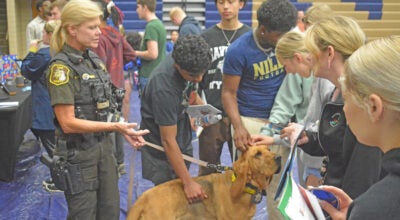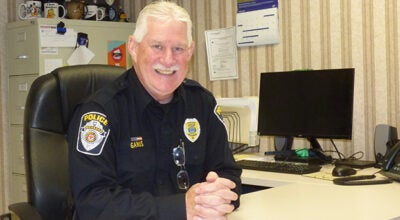Cass County sees increase in homelessness
Published 5:45 pm Sunday, November 28, 2010
A total of 115 families, representing 362 individuals, came to Community Resource Connect at Federated Church in Dowagiac in search of help Nov. 19.
Twenty agencies were present to meet the needs, including Cancer Services, Child and Family Services, Community Dental Clinic, DASAS, Department of Human Services (DHS), Disability Network, Legal Aid, McKinney Vento, Michigan Works, Pathfinders, the Pokagon Band, Salvation Army, Senior Care, Southwestern Michigan Community Action Agency (SMCAA), Tri-County Head Start, WIC and Woodlands.
Twenty-nine of the 115 individuals identified themselves as homeless.
The length of time they had experienced homelessness ranged from 24 hours to three to four years.
Most were staying with friends or family.
Two families were lodged in hotels.
One family had been living in a truck for more than two weeks.
Despite increased planning and coordination among agencies, the number of homeless in Cass County continues to climb.
Thirty-eight homeless individuals were entered into the Homeless Management Information System (HMIS) in Cass County in 2009, up from 34 in 2008.
Yet this year 94 Cass County students were identified as homeless.
And this number appears to be unrealistically low.
A truer number is between 396 and 792 (10-20 percent of all students receiving free and reduced lunches in Cass County, based on McKinney Vento research).
How can there be 94 homeless students, but only 38 homeless individuals?
The McKinney Vento Act uses a broader definition of homelessness that includes many foster children and doubled-up families, while MSHDA and HUD use the following definition of homelessness:
• Lacks a fixed, regular and adequate night time residence.
• Has a primary night time residence that is a supervised publicly or privately operated shelter designed to provide temporary living accommodations (including welfare hotels, congregate shelters and transitional housing.
• An institution that provides a temporary residence for individuals intended to be institutionalized.
• A public or private place not designed for, or ordinarily used as, a regular sleeping accommodation for human beings.
Tammy Curtis, homeless liaison for the Marcellus School District, has done an excellent job identifying and providing services to McKinney Vento students.
In the 2009 – 2010 school year, Tammy identified 53 homeless students and used McKinney Vento and Title 1 funds to provide services that include transportation, tutoring and the opportunity for students to participate in events outside of school hours.
Tammy, who is also a school counselor, reports that these students are doing well academically.
Buzz Calvert, regional McKinney Vento Act coordinator, reports that without support, homeless students are at-risk for educational failure.
On the average, it takes from four to six months for a student to regain his former academic status after a period of homelessness.
While shelter is available for families with children and single women, there is no emergency shelter for single men in Cass County.
Most unsheltered men are considered chronically homeless; they typically have a disability/diagnosis.
Woodlands will be closing its Residential Treatment Center Dec. 1.
Simeon’s Hope, a severe weather shelter hosted by the Federated Church in Dowagiac, offers weekend shelter.
There is no severe weather shelter available during the week.
How can Cass County reduce homelessness?
Jennifer Keller, SMCAA housing specialist, is the single point of entry for housing assistance in Cass County.
Since September she has been working full-time in Cass County; her office is conveniently located within DHS.
When Jennifer encounters an extremely difficult situation, she will call an Interagency Service Team meeting to brainstorm housing solutions.
An example of someone who falls into this category is “Denise.”
Denise was living with her boyfriend in a mobile home park in Cassopolis.
Neither was employed. They both lived off his Social Security disability income.
In June o2010, both were arrested on drug charges and sent to jail.
Denise was released after serving 40 days; her boyfriend’s charges were more serious and he remains in jail.
While she was in jail they were evicted from their mobile home and all contents were removed.
When she was released from jail at 6:30 in the morning on Aug. 6, Denise had no money, no identification, no ride and no home.
The jail nurse was aware of Denise’s situation and made arrangements with a Navigator volunteer, who appealed to Hope’s Door, who accepted her as a resident for the weekend.
(Even though she was arrested on drug charges, Denise doesn’t use drugs herself, and so was not eligible for transitional housing at Hope’s Door.)
On Monday, the volunteer took Denise to the Decatur Family Shelter.
On the way to the shelter, she said, “It seems like no one cares whether I live or die”.
Denise stayed at the Decatur Family Shelter for the next 90 days.
At that time the shelter was not staffed during the day, so residents left at 8:30 in the morning and could return at 5:30 in the evening.
This was a rough time for Denise, who suffers from epilepsy, confusion, depression and panic attacks.
Navigator volunteers provided transportation when Denise had to meet with her probation officer in Cassopolis.
SMCAA was able to place Denise in a transitional housing unit in Cassopolis.
She has now been approved for a Tenant-based Rental Assistance Voucher and is searching for her own apartment.
To keep this apartment, she will need some income to be able to pay for utilities.
She has twice been denied Social Security disability.
She does not qualify for services from Woodlands.
However, she has found a medical home with Cass Family Clinic and is attending a church within walking distance.
She attends the weekly Hope’s Door support group in Dowagiac.
Her neighbors occasionally give her rides.
Will Denise become one of the chronically homeless, will she achieve independence or will she manage to survive with support from DHS, SMCAA, Hope’s Door, the clinic, the church and the community?
To Denise, the future is looking better every day, even without furniture.
For information about helping the homeless, please contact Ruth Andrews, coordinator, Cass County Housing Continuum of Care, at (269) 445-0269.






